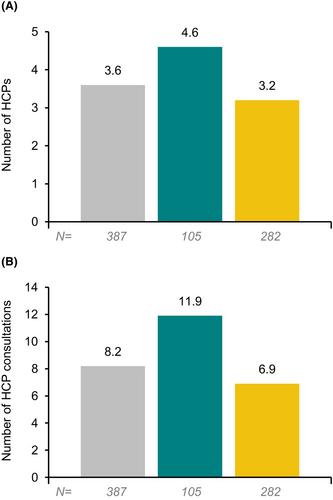The impact of diagnosis delay on European patients with generalised myasthenia gravis
Abstract
Objective
The objective was to determine the mean duration of diagnosis delay for patients with myasthenia gravis from five European countries and explore the impact of >1 year diagnosis delay.
Methods
Patients with myasthenia gravis (N = 387) from Europe (France/Germany/Italy/Spain/United Kingdom) and their physicians participated in the Adelphi Real World Myasthenia Gravis Disease Specific Programme™. Diagnosis delay (time from symptom onset to diagnosis) was calculated and characteristics described for patients experiencing >1 year and ≤1 year diagnosis delay. Denominators varied according to outcome as missing data were not imputed.
Results
Mean (standard deviation) diagnosis delay was 363.1 (520.9) days, and 27.1% (105 out of 387) of patients experienced diagnosis delay >1 year. Among patients with >1 year and ≤1 year diagnosis delay, respectively, 69.2% (72 out of 104) and 17.4% [45 out of 259] had initially received a different diagnosis (physician-reported); 40.0% (42 out of 105) and 24.1% (68 out of 282) were Myasthenia Gravis Foundation of America class III at the time of the survey (physician-reported); 72.4% (76 out of 105) and 61.3% (173 out of 282) had fatigue (subjective physician reporting from a pre-selected list of symptoms); 30.5% (32 out of 105) and 17.4% (49 out of 282) had anxiety and 21.9% (23 out of 105) and 13.1% (37 out of 282) had depression (both subjective physician reporting from a pre-selected list, Likert-style); and mean (standard deviation) MG-QoL-15r score was 14.4 (5.50) and 12.6 (7.84) (self-reported by N = 43 and N = 74 patients, respectively).
Interpretation
More than a quarter of patients with myasthenia gravis experienced diagnosis delay of >1 year. These patients had a different clinical profile with regards to severity, symptoms, comorbidities and MG-QoL-15r score, compared with patients experiencing ≤1 year diagnosis delay.


 求助内容:
求助内容: 应助结果提醒方式:
应助结果提醒方式:


